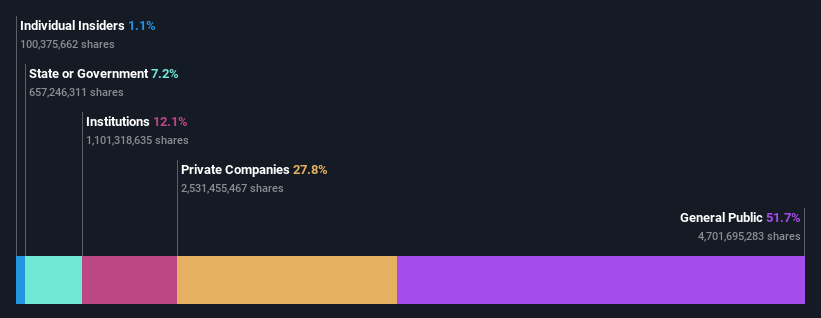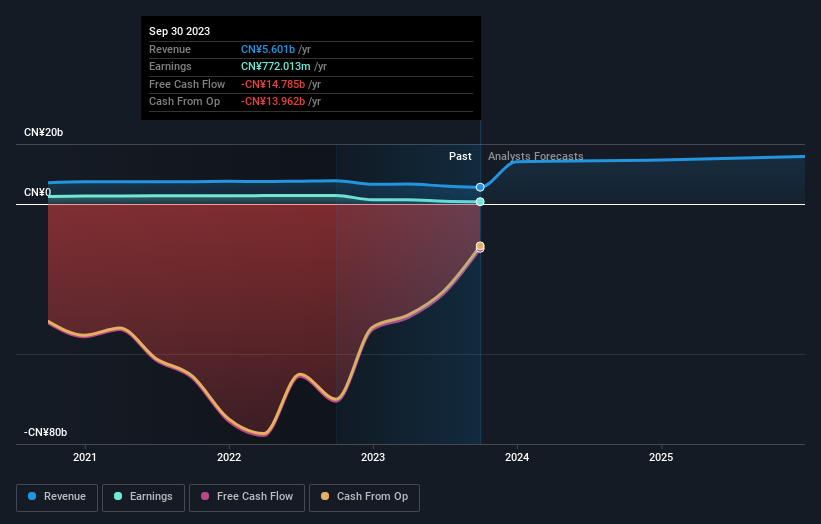Bank of Zhengzhou Co., Ltd.'s (HKG:6196) stock price dropped 5.7% last week; retail investors would not be happy

Key Insights
- Bank of Zhengzhou's significant retail investors ownership suggests that the key decisions are influenced by shareholders from the larger public
- The top 25 shareholders own 48% of the company
- Institutional ownership in Bank of Zhengzhou is 12%
If you want to know who really controls Bank of Zhengzhou Co., Ltd. (HKG:6196), then you'll have to look at the makeup of its share registry. We can see that retail investors own the lion's share in the company with 52% ownership. That is, the group stands to benefit the most if the stock rises (or lose the most if there is a downturn).
As market cap fell to HK$18b last week, retail investors would have faced the highest losses than any other shareholder groups of the company.
Let's delve deeper into each type of owner of Bank of Zhengzhou, beginning with the chart below.
See our latest analysis for Bank of Zhengzhou

What Does The Institutional Ownership Tell Us About Bank of Zhengzhou?
Many institutions measure their performance against an index that approximates the local market. So they usually pay more attention to companies that are included in major indices.
As you can see, institutional investors have a fair amount of stake in Bank of Zhengzhou. This can indicate that the company has a certain degree of credibility in the investment community. However, it is best to be wary of relying on the supposed validation that comes with institutional investors. They too, get it wrong sometimes. If multiple institutions change their view on a stock at the same time, you could see the share price drop fast. It's therefore worth looking at Bank of Zhengzhou's earnings history below. Of course, the future is what really matters.

Bank of Zhengzhou is not owned by hedge funds. Our data shows that Zhengzhou Municipal Finance Bureau is the largest shareholder with 7.2% of shares outstanding. Zhengzhou Zhongrongchuang Industrial Investment Co., Ltd. is the second largest shareholder owning 6.7% of common stock, and Bridge Trust Co., Ltd holds about 4.2% of the company stock.
Our studies suggest that the top 25 shareholders collectively control less than half of the company's shares, meaning that the company's shares are widely disseminated and there is no dominant shareholder.
While it makes sense to study institutional ownership data for a company, it also makes sense to study analyst sentiments to know which way the wind is blowing. While there is some analyst coverage, the company is probably not widely covered. So it could gain more attention, down the track.
Insider Ownership Of Bank of Zhengzhou
While the precise definition of an insider can be subjective, almost everyone considers board members to be insiders. Company management run the business, but the CEO will answer to the board, even if he or she is a member of it.
Most consider insider ownership a positive because it can indicate the board is well aligned with other shareholders. However, on some occasions too much power is concentrated within this group.
Shareholders would probably be interested to learn that insiders own shares in Bank of Zhengzhou Co., Ltd.. This is a big company, so it is good to see this level of alignment. Insiders own HK$194m worth of shares (at current prices). Most would say this shows alignment of interests between shareholders and the board. Still, it might be worth checking if those insiders have been selling.
General Public Ownership
The general public -- including retail investors -- own 52% of Bank of Zhengzhou. This size of ownership gives investors from the general public some collective power. They can and probably do influence decisions on executive compensation, dividend policies and proposed business acquisitions.
Private Company Ownership
It seems that Private Companies own 28%, of the Bank of Zhengzhou stock. Private companies may be related parties. Sometimes insiders have an interest in a public company through a holding in a private company, rather than in their own capacity as an individual. While it's hard to draw any broad stroke conclusions, it is worth noting as an area for further research.
Next Steps:
I find it very interesting to look at who exactly owns a company. But to truly gain insight, we need to consider other information, too. Case in point: We've spotted 2 warning signs for Bank of Zhengzhou you should be aware of, and 1 of them shouldn't be ignored.
If you are like me, you may want to think about whether this company will grow or shrink. Luckily, you can check this free report showing analyst forecasts for its future.
NB: Figures in this article are calculated using data from the last twelve months, which refer to the 12-month period ending on the last date of the month the financial statement is dated. This may not be consistent with full year annual report figures.
Valuation is complex, but we're here to simplify it.
Discover if Bank of Zhengzhou might be undervalued or overvalued with our detailed analysis, featuring fair value estimates, potential risks, dividends, insider trades, and its financial condition.
Access Free AnalysisHave feedback on this article? Concerned about the content? Get in touch with us directly. Alternatively, email editorial-team (at) simplywallst.com.
This article by Simply Wall St is general in nature. We provide commentary based on historical data and analyst forecasts only using an unbiased methodology and our articles are not intended to be financial advice. It does not constitute a recommendation to buy or sell any stock, and does not take account of your objectives, or your financial situation. We aim to bring you long-term focused analysis driven by fundamental data. Note that our analysis may not factor in the latest price-sensitive company announcements or qualitative material. Simply Wall St has no position in any stocks mentioned.
About SEHK:6196
Bank of Zhengzhou
Provides various banking products and services in the People’s Republic of China.
Flawless balance sheet and fair value.

